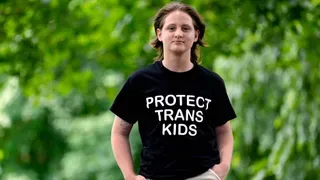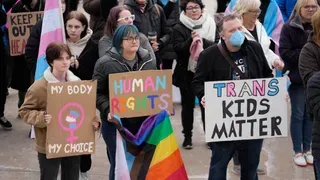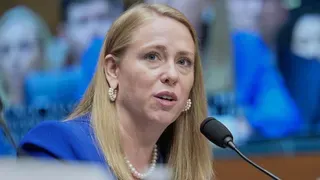September 29, 2012
L.A. Panel Explores Challenges of Islam and Homosexuality
Les Spindle READ TIME: 4 MIN.
What are the challenges encountered by LGBT citizens who are followers of the Islamic faith, in the U.S. and internationally? Have discriminatory attitudes toward this subculture been exacerbated by anti-Muslim sentiments in our era of terrorist violence? Complex issues related to this social phenomenon were explored in "Cultures in Collision: Islam and Homosexuality," a panel discussion held September 24 at the L.A. Gay and Lesbian Center's Cultural Arts and Education Department in Hollywood.
"During this discussion, I think we spoke to something really deep within our hearts that can't be marred by terrorists or bad media or fanatics, or people who tell us we're wrong," said panel moderator Naveed Merchant, an LGBT and Muslim activist.
Panelist Ani Zonneveld is a singer-songwriter-producer-activist, originally from Malaysia. She co-founded Muslims for Progressive Values, an L.A.-based organization dedicated to furthering the ideals of human dignity and social justice found in the Islamic religious text, the Qur'an. A married heterosexual woman known for her tireless support of LGBT and other human-rights concerns, Zonneveld spoke eloquently about obstacles faced by gay Muslims, and offered a sampling of her inspirational song compositions.
Joining her was ?pek ?pek�io?lu, a Turkish/German lesbian now residing in Germany, who said she grew up as a Muslim woman in a highly patriarchal environment. She pursued a degree in social work in her efforts to change the constructs of oppressive cultures. She subsequently became a world-renowned DJ.
Like Zonneveld, she offered enlightening insights into the pertinent issues at hand, including amusing and revelatory anecdotes. One particularly vivid recollection was the time when she explained the nature of lesbianism to her 74-year-old grandfather, giving him a blunt and eye-opening crash course. Similarly, she argued against her sister's assertion that homosexuality was a "sickness," gradually getting this sibling to say, "Perhaps I should be a lesbian."
Being Muslim After 9/11
Zonneveld stressed that it was really only after the September 11, 2001, terrorist attacks in the U.S. that Muslims had to be closeted about who they are. She described one incident that was crucial in her growing awareness of ignorance toward the Islam faith. She had shared a friendly conversation with a woman on a plane who at the end of this exchange asked her about her religious faith. When Zonneveld said, "Islam," the woman responded that she had "never heard of that church."
"It's a huge leap from that level of unawareness to the image of Muslims that came after the terrorist attacks of 9/11," said Zonneveld.
Merchant also spoke of the urgency of raising awareness of the gay Muslim's journey.
"It makes all the difference in the world for me to have two parts of my identity in harmony with each other," said Merchant. "Having already broken out of the closet as a gay man, I found myself having to really worry and question how I can be 'out' as a Muslim." He said that it formerly was not a big deal to tell his coworkers or acquaintances when he was fasting for religious reasons or that he was observing a Muslim holiday, similar to their observances for Christmas or Yom Kippur.
An important viewpoint expressed by the panelists was that in some nations with a primary Islamic population, the problem of LBGT oppression doesn't have to do with the religion itself, but more often stems from the prevalent patriarchal culture.
"We live in a country where Mitt Romney advocates a nuclear family with family values, which centers on the male making all the tough decisions," said Merchant, making a telling comparison point about the U.S.
He believes that Islam in itself is not patriarchal, saying, "It was the first religion to give women the rights to property. But there are a lot of problems as to how the religious beliefs get interpreted through a patriarchal lens. That's where you see the concept of men having to be as masculine as possible, therefore not entertaining the thought of being more in touch with their transgender side. That's not a weakness, but it's seen as a weakness."
Zonneveld challenged perceptions within the Islam community that the Holy Scriptures condemned homosexuality. She said that the Story of Lot in the Qur'an was not focused on men-to-men sexual activity, that it was about rape and the assertion of power.
"Prophet Mohammed never condemned homosexuality," she said.
And for ?pek�io?lu, she continues striving to balance the myriad facets of her identity as a German, a Turk, a Muslim and a lesbian. She expressed concerns such as being able to be buried with her family while keeping her tattoos, which are not allowed in the Muslim faith. Also, gay marriages are not legal in Turkey. The combination of forces made everyday life difficult.
"You don't go through this process of being gay and being Muslim without questioning both at certain times," said Merchant.
For more information on this discussion, visit http://laglc.convio.net/site/PageServer?pagename=YW_LC_Big_Queer_Convo
To listen to the event in its entirety, visit http://equalityvideo.org/BQC.mp3







